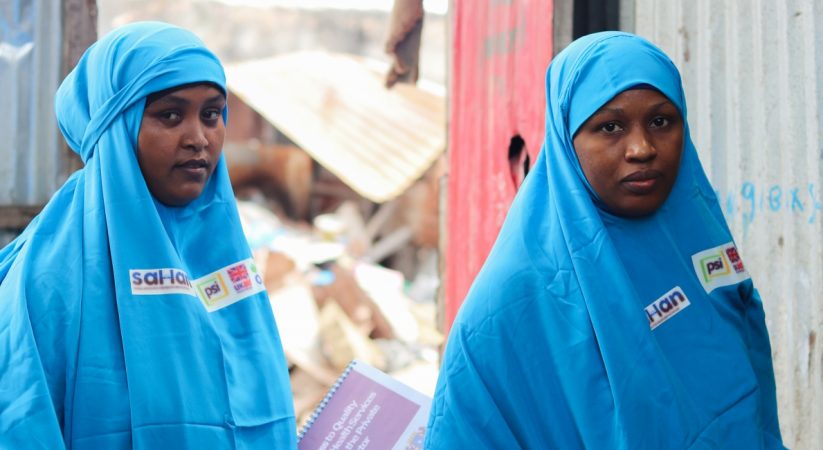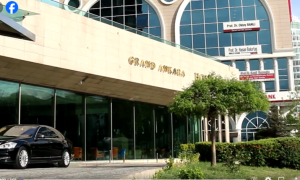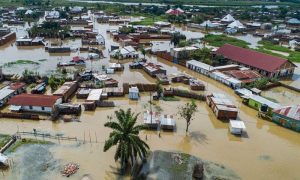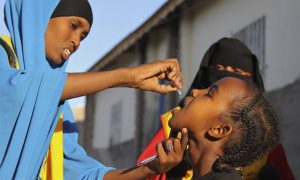
February 26, 2020 – When it comes to health care, it’s not enough to simply offer lifesaving services – people must also want to seek those services. That’s why we see ads on the subway for mental health programs, hear about insurance open enrollment periods on the radio, and learn about new medicines on TV. It’s also why Somalia is investing in influencers – and no, we’re not talking about Instagram.
Meet Somalia’s Female Community Influencers: 50 women charged with increasing the number of mothers who are aware of and utilize maternal health services offered through the Somali Health and Nutrition (SHINE) Program. Working in pairs, these influencers cover three districts in Mogadishu. They go from home to home, meeting with mothers, and discussing behavior changes that women can make to improve both their health and that of their children, including topics like breastfeeding, birth spacing, and delivering their babies at a health facility.
With an average of one in 100 mothers dying from childbirth-related complications, Somalia has the seventh highest maternal mortality rate in the world. Many traditional birth attendants are not equipped to handle maternal complications, which contributes to this high maternal mortality rate. That’s where the influencers come in – they are working to change the negative perceptions about health facilities and to increase the number of mothers who safely give birth within them.
Changing minds – and long-standing traditions – is no easy task. The influencers have to do both, especially when it comes to giving birth. For generations, mothers have passed down a culture of giving birth at home with traditional birth attendants, rather than in health facilities.
“I gave birth to four of my children at home. This is something my mother and those before her did,” says 29-year-old Amina, a mother whose views are typical for many women in and around Mogadishu. “My grandmother is a traditional midwife and she discouraged me from visiting the Maternal Health Center. I never wanted to go to the health facility because I thought men are the ones who aid in delivery matters and that is against our culture.”

Photo: Fardosa Hussein
for Action Against Hunger,
Somalia
When Amina was six months pregnant, two committed influencers – one also named Amina and the other named Fardosa – visited her home. As the three women talked, Amina’s beliefs about health facilities started to change.
“I really wanted to give birth to my fifth child at the health facility, but I had so much fear in me,” says Amina. “Amina and Fardosa were very professional and they allowed me to ask all the questions I had and help to demystify the stereotypes about health facilities.”
At the Maternal and Child Health Center, mothers are offered health education and counseling during pregnancy and upon delivery. After hearing frequent reminders from the influencers, Amina sought counseling for the final months of her pregnancy.

Photo: Fardosa Hussein
for Action Against Hunger,
Somalia
“I was happy that the two ladies…reminded me to visit the health center,” recalls Amina. “They encouraged me to share my experience with them so they could help whenever possible.”
But, when her due date arrived, Amina still had lingering doubts and almost opted to deliver her baby at home, but decided against it.
“I called one of the [influencers], who immediately called the ambulance,” she says. “When I got to the health center, I was taken to the delivery room and my mother waited outside. Two midwives and a nurse attended to me. That’s when I discovered that mothers are given utmost privacy at the health facility. Throughout the day, my newborn and I were given proper care.”
Amina was filled with joy after safely giving birth to a healthy baby boy. She and her son headed home with additional supplies from Action Against Hunger’s water, sanitation, and hygiene team, including medicine, soap, a jerrican, and buckets. Amina plans to return to the health center frequently to support the development of her newborn and her other children: “I am looking forward to taking my son for immunizations and visiting the health center to keep track of my and my children’s health.”
These activities to promote and improve health-seeking behavior changes in the Banadir region were carried out in support of SAHAN Hoyo Ku Hoyo (HkH) – a mother to mother model of support – a project led by UKAiD and Population Services International (PSI).
Action Against Hunger is the world’s hunger specialist and leader in a global movement that aims to end life-threatening hunger for good within our lifetimes. For 40 years, the humanitarian and development organization has been on the front lines, treating and preventing hunger across nearly 50 countries. It served more than 21 million people in 2018 alone.
.
.
.
Xafiiska Wararka Qaranimo Online | Muqdisho
_________________________________________________
Xafiiska Wararka Qaranimo Online | Mogadishu, Somalia
_____________________________________________________________________________________Advertisement
_____________________________________________________________________________________







